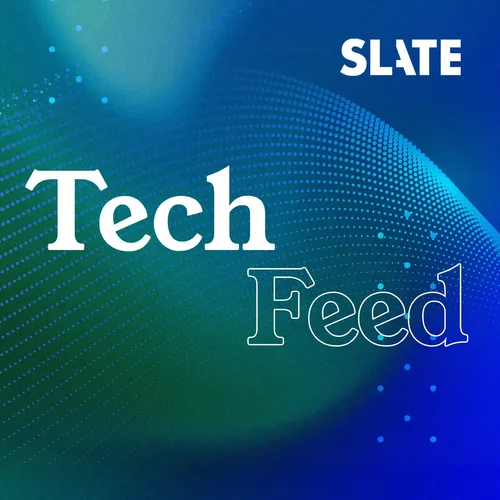
Slate Technology
Technology coverage from across the Slate Podcast network
- Update frequency
- every day
- Average duration
- 35 minutes
- Episodes
- 905
- Years Active
- 2018 - 2025

Introducing: Thrilling Tales of Modern Capitalism
Hey Secret History listeners! We'd like to introduce a new show from Slate, Thrilling Tales of Modern Capitalism. Each episode dives into the history of a brand that shapes the way we live and work. …
00:21:41 |
Wed 27 May 2020

Introducing Cautionary Tales
Hello, Secret History fans! Here's an episode of another show we think you might like: Cautionary Tales from Pushkin Industries.
Learning from our mistakes can be hard. Learning from other people’s …
00:37:09 |
Mon 16 Dec 2019

Introducing What Next: TBD
Hey Secret History of the Future fans! We're excited to introduce you to another show we think you'll like. It's called What Next: TBD, and it's a weekly show about tech, power, and the future. Secre…
00:22:52 |
Tue 26 Nov 2019

S2E10: New Media, Old Story
Radio was originally a social medium, as early radio sets (each of which could transmit as well as receive) turned cities into giant chatrooms, populated by Morse Code-tapping enthusiasts. But the ex…
00:42:00 |
Wed 04 Sep 2019

S2E9: A Brief History Of Timekeeping
The first mechanical clocks were made to summon monks to prayer. Ever since, timekeeping technology has often been about control and obligation. But underneath a mountain in Texas, a new kind of cloc…
00:36:41 |
Wed 28 Aug 2019

S2E8: Salvation In The Air
At the dawn of the 20th century, chemists dreamed of extracting nitrogen from the air and turning it into a limitless supply of fertiliser. Sceptics thought they were crazy -- it was possible in theo…
00:37:06 |
Wed 21 Aug 2019

S2E7: A Bug In The System
The first ever computer program was written in 1843 by Ada Lovelace, a mathematician who hoped her far-sighted treatise on mechanical computers would lead to a glittering scientific career. Today, as…
00:35:21 |
Wed 14 Aug 2019

S2E6: Dots, Dashes, and Dating Apps
In the 19th century, young people wooed each other over the telegraph. But meeting strangers on the wires could lead to confusion, disappointment, and even fraud. Do modern online dating apps have an…
00:36:49 |
Wed 07 Aug 2019

S2E5: Mars on Earth
Polar exploration was the Victorian equivalent of the space race. Major powers vied to outdo each other, funding expeditions to the most inhospitable parts of the world as demonstrations of their sup…
00:37:56 |
Wed 31 Jul 2019

S2E4: Meat and Potatoes
The potato seemed strange and unappetizing when it first arrived in Europe. But it grew into a wonder food that helped solve the continent’s hunger problems. Can its journey tell us what to expect fr…
00:39:50 |
Wed 24 Jul 2019

S2E3: Unreliable Evidence
In the early 20th century a new forensic technique—fingerprinting—displaced a cruder form of identification based on body measurements. Hailed as modern, scientific, and infallible, fingerprinting wa…
00:31:37 |
Wed 17 Jul 2019

S2E2: Second Wind
For thousands of years we sailed our cargo across oceans using zero-emission, 100 percent renewable wind. Then we switched to ships that run on oil, creating a global maritime fleet that pumps greenh…
00:32:46 |
Wed 10 Jul 2019

S2E1: A Familiar Tune
The 19th century invention of the phonograph left composers worried they might not be paid for recordings. The 20th century proliferation of digital sampling outmoded old copyright laws. Can these pr…
00:43:56 |
Wed 03 Jul 2019

Season 2 Trailer
What can 19th century polar exploration teach us as humans plan missions to Mars? Do modern online dating apps have anything to learn from romances over the telegraph wires? Dig into the past, and yo…
00:02:33 |
Wed 26 Jun 2019

S1E10: Infinite Scroll
The Renaissance scholars couldn’t keep up with new information (“Have you read the latest Erasmus book?” “I don’t have time!”) and needed a better way to organize it. Thus came the invention of table…
00:38:31 |
Wed 07 Nov 2018

S1E9: A Little Less Conversation
Some people thought the laying of the transatlantic cable might bring world peace, because connecting humans could only lead to better understanding and empathy. That wasn’t the outcome, and recent u…
00:30:24 |
Wed 31 Oct 2018

S1E8: VR or It Didn’t Happen
In the Victorian era, plaster casts became a way to preserve important artifacts in 3-D. Now, virtual reality promises to preserve places and experiences. But who decides what gets preserved? And is …
00:32:01 |
Wed 24 Oct 2018

S1E7: A Clock in the Sky
In 1714, British parliament offered a huge cash prize to anyone who could find a way to determine longitude at sea. And it worked, sort of ... several decades later. Are modern contests (DARPA challe…
00:34:57 |
Wed 17 Oct 2018

S1E6: From Zero to Selfie
In 1969, an anthropologist introduced photographs and films to people in Papua New Guinea who’d never seen themselves represented in media before. It changed their conception of the world. In modern …
00:37:03 |
Wed 10 Oct 2018

S1E5: Human Insecurity
The French telegraph system was hacked in 1834 by a pair of thieves who stole financial market information -- effectively conducting the world’s first cyber attack. What does the incident teach us ab…
00:30:10 |
Wed 03 Oct 2018
Disclaimer: The podcast and artwork embedded on this page are the property of Slate. This content is not affiliated with or endorsed by eachpod.com.